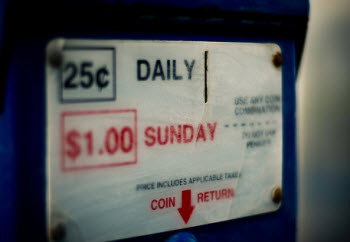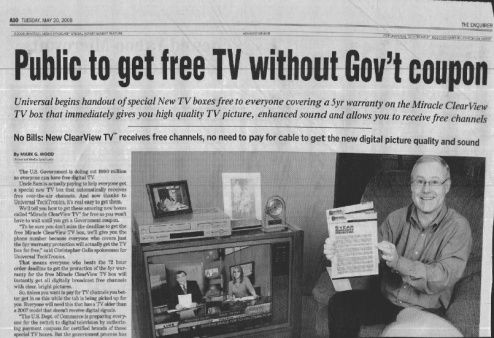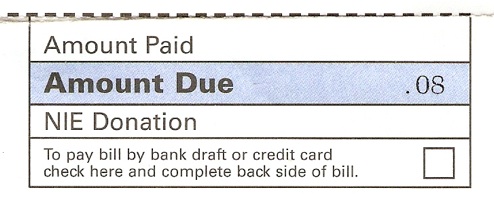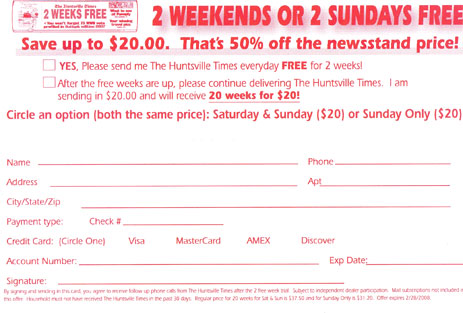Consumer affairs columnist George Gombossy has worked for the Hartford Courant since 1969—longer than most Consumerist readers have been alive. Yesterday was his last day at the paper, but he wasn’t caught up in one of the rounds of buyouts and layoffs hitting the newspaper industry. Gombossy claims that he was “was fired for doing [his] job,” after his last column exposed the bedbug-infested mattresses sold by a major Courant advertiser.
newspapers
../../../..//2009/08/07/newspaper-death-watch-the/
Newspaper Death Watch: The Boston Globe has joined Rupert Murdoch’s News Corp. in announcing that they will begin charging for their respective websites. [Editor & Publisher] (Photo:inju)

The Economy Is So Bad Now That Investors See Newspapers As A Growth Industry
In the face of News Corp. announcing profits fell 70 percent for the quarter that ended March 31, chairman Rupert Murdoch is cautiously optimistically about his papers, even though his rags, which include the Wall Street Journal, New York Post and Aussie and British periodicals, have dipped 28 percent in revenue.

Chicago Tribune Fires Reporter Covering The Recession
Let’s pause a moment to consider this sentence from Crain’s Chicago Business. “On the same day the Chicago Tribune cut 53 jobs from its newsroom, its parent Tribune Co. asked a Bankruptcy Court to approve of $13.3 million in bonuses and other incentive payments to 703 employees.”
../../../..//2009/03/17/newspaper-death-watchthe-146-year-old-seattle/
Newspaper Death Watch:The 146-year-old Seattle Post-Intelligencer will stop publishing after today and will become an online only publication with about 20 reporters and editors. [MSNBC]

It's Official: Newspapers Are Dying
Next week, the 146-year-old Seattle Post-Intelligencer will probably stop publishing, following the Rocky Mountain News into oblivion. After its demise, the Tucson Citizen will probably be the next to go.

../../../..//2009/03/10/time-magazine-lists-the-10/
Time magazine lists the 10 most endangered newspapers… and it’s a pretty bleak list. We enjoy quite a few of these fine publications. Save the Minneapolis Star Tribune! They write about Target and Best Buy and are nice to us! [Time]
../../../..//2009/02/23/two-philadelphia-newspapers-the-inquirer/
Two Philadelphia newspapers, the Inquirer and the Daily News filed for bankruptcy Sunday. [NYT]
../../../..//2009/01/16/the-minneapolis-star-tribune-whose-excellent/
The Minneapolis Star-Tribune, whose excellent Best Buy and Target coverage we really appreciate, has filed for Chapter 11 bankruptcy. [Reuters]
../../../..//2008/09/18/financial-illiteracy-has-reached-epidemic/
“Financial illiteracy has reached epidemic levels.” Author Braun Mincher has an editorial in the Austin American-Statesman on why every school in the U.S. should teach financial literacy. [Statesman]

It's A Miracle! This Free Digital TV Converter Box Will Cost Me $100
We know you’re too smart to fall for this ridiculously fraudulent digital TV converter offer, but maybe you know someone who’s not wise to the facts of the upcoming switch to digital TV—specifically that converter boxes cost less than $100, and that you can get a government coupon to offset $40 of that cost. Universal TechTronics—the same scam outfit behind those “Amish” Heat Surge miracle fireplaces—is now conning the less knowledegable with their “free” converter box offer: pay nothing but a warranty and shipping, bringing the total cost to anywhere between $68 and $97. The Los Angeles Times says this is “the first large-scale [converter box] scam the Better Business Bureau has seen.”

Senate Committee Votes To Rollback FCC's Media Consolidation Plan
Poor Kevin Martin. The Senate is well on its way towards killing his proposal to let newspapers get all freaky and consolidate with television and radio stations. Martin shouldn’t be too surprised: this is exactly what happened the last time a FCC Chairman tried to ram media consolidation down our throats.

Why Did The Tennessean Send This Bill For $0.08?
The Tennessean sent reader MP a bill for eight cents three months after he canceled his promotional subscription. MP has no intention of wasting a relatively expensive stamp to pay this trifle of a bill, but he would like to know: what could possibly costs eight cents?

Read The Wall Street Journal For Free
Why pay $79 per year to read the Wall Street Journal when you can read it for free? Murdoch’s crown jewel attracts readers by lowering the pay wall for visitors from Google News, Drudge, or Digg. Salon posted step-by-step instructions to help readers exploit this selective generosity.

Worst Business Reply Postcard Ever
Can you spot what’s wrong with this Business Reply postcard? That’s right, The Huntsville Times wants you to write down your full contact information and credit card number on a postcard and send it through the mail where anyone can see it. Hellooooo, identity theft.

Boston Consumer Columnist Says Goodbye
Bruce Mohl, the “Consumer Beat” columnist at the Boston Globe, is leaving after 12 years of writing about consumer complaints and issues. His column this past Monday recaps some of the most consistent topics he’s covered, and a quick glance confirms that some things never change—insurance rates, uneven consumer advocacy at the state level, funeral price gouging, privacy and identity theft are all things he touches on in his last column.

FCC Says Comcast Can't Buy More Cable Companies, But Murdoch Can Own Everything
Today, in an attempt to anger fans of both regulation and deregulation, the FCC approved two new rules. The first one restricts cable companies to owning no more than 30% of a market; the second one “gives owners of newspapers more leeway to buy radio and television stations in the largest cities.” One nice thing about the first rule is that Comcast can’t buy any more cable companies. One bad thing about the second one is that it will likely mean that Rupert Murdoch will win “permanent waivers to control two television stations in New York, as well as The New York Post and The Wall Street Journal.”



Simon Says Newspapers Would Be Killing Themselves Even Without The Help Of The Internet
For the definitive dramatic take on why and how the newspaper industry has fallen so hard, watch season five of HBO’s The Wire, much of which is set inside the beleaguered Baltimore Sun newsroom. The show has it all: The ever-present desperation and dread. The hushed, huddled stand-up meetings in which colleagues whisper about who they think the next round of layoffs will hit. The strain of fewer people, many with less experience and training than they need, trying to handle more responsibilities for diminishing pay and benefits.